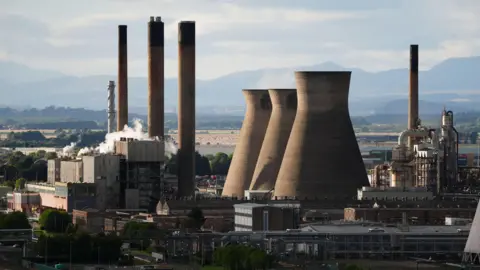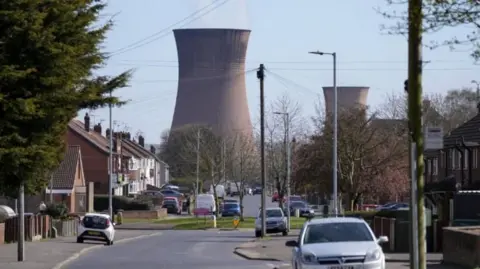Why not nationalise Grangemouth after British Steel takeover?
 PA Media
PA MediaFor the Scottish government, nationalisation has been a last resort, used at times of crisis or service failure.
Public control of companies is not part of its ideology, though it has reached for that lever when crisis struck at Prestwick Airport, Ferguson shipyard and when ScotRail was deemed to be failing in private hands.
Nationalisation carries the weight of memory from the 1970s, when it got a bad name, for loss-making, poor productivity and poor quality.
But times have changed, in many ways. It is not just that memories of the seventies have faded like a cheesecloth shirt, but that countries are now in the business of protecting strategic industries.
Political leaders are now hauling in supply chains that have adapted to stretch around the world and now look vulnerable to the whims of foreign leaders and the realignment of big power blocs.
In response to international competition, relying on increased productivity is proving ever more difficult to achieve.
Offshoring jobs is politically more contentious, and the rising demand for a coherent defence industry at or close to home has exposed gaping holes where supply lines ought to be.
And in the drive towards replacement of oil and gas by greener energies, they recognise the role of the state is vital in making that happen.
Ever more regulation and price signals from carbon to energy may not be enough to cut it. So the leftist dream of taking ownership of the commanding heights of the economy do not look so dangerously radical.
That's how even the Reform UK party swung behind near-nationalisation of the Scunthorpe steel works, with a special session of the Westminster Parliament on Saturday.
That has been followed by Chinese owners being frozen out and new bosses appointed by Whitehall ministers, with instructions to source the materials needed to keep Scunthorpe's blast furnaces blasting.
Why Scunthorpe in particular? And why not other strategic assets?
The SNP at Westminster, now backed by the first minister, John Swinney, believe the oil refinery at Grangemouth should also be nationalised, because it's a strategic economic asset.
The practicalities of making steel require that the system runs hot, and when the initial iron-making process is allowed to cool down, it is difficult or impossible to restart.
Hence the speed of response when ministers discovered that the plant's Chinese owners were not stocking up the materials needed.
The Lincolnshire plant is the only plant in the UK that can still make steel from its raw materials. Other steel plants have closed, including Redcar ten years ago. In the case of Port Talbot in Wales, the process was shut down last year, for adaptation to run new furnaces to recycle steel, using a far smaller workforce.
Recycled metal can have a lower carbon footprint. But in general, it's not as high quality, when reliable strength is required for new rail lines, construction and the defence industry.
 Reuters
ReutersMuch is made by the UK government of the risk that Britain could become the only member of the G7 group of large market economies that does not have its own virgin steel production.
A few years ago, with globalisation still on the rise, that might not have mattered. It does now.
Grangemouth has two similarities. One is that it has Chinese owners. PetroChina has a 50% stake, the other half held by Ineos.
One argument for taking over Scunthorpe is that Chinese owners have an interest in making the UK dependent on imports, when China has the biggest over-supply for exports in the world.
An argument can also be made that it could be in the strategic interests of an unfriendly China that the UK lacks oil refining capacity and has to rely on imports. But as China is a net importer of oil and gas, it's less obvious that China gains from that.
The other similarity is that both industries are going through a difficult transition. The steel industry is a notoriously big polluter. The product will still be needed in future, so either it switches to cleaner electricity or its carbon output is offset. Neither is simple.
 PA Media
PA MediaOil will also be needed in future, but much less of it. The rundown of oil refining is in line with UK and Scottish government policies to reduce greenhouse gas emissions, both in the refining process and in the subsequent burning of oil products.
The UK will still has five refineries. Grangemouth is the oldest in Britain and needed a lot of investment to keep it going as an oil refinery.
And instead of shutting it down, the PetroIneos partnership has a plan - first, to use the site as an import terminal to retain the flow of oil to transport, industry and home heating across much of Scotland and the north of England. and after a long wait, to use the site for next generation energy.
Project Willow, co-funded by the UK and Scottish governments, recently gave some shape to the kind of work that could be done there, including biofuels and carbon capture.
The owners and the government are aligned on that plan. So nationalisation is not necessary to make it change, or to make it happen. The key difference between the Scottish government and PetroIneos is the timescale for shutting down the oil refinery, and whether the workforce can be a bridge between the old and new tech.
To commit to the next stage, with the scale of investment required for Grangemouth to implement parts of Project Willow, would be a significant drain on limited capital funds in government budgets, for many years to come.
The private sector would argue that they could be more efficiently sourced through private finance markets.
It remains a challenge for governments to keep private companies on track for the commitments they make to renew strategic economic assets. Others include ports and airports, as well as roads, schools and hospitals built with private finance and leased back to the public sector.
A significant commitment of funding towards that can help keep such projects on track. And while refusing to acknowledge similarities between Scunthorpe and Grangemouth and the SNP case for nationalisation, that promise of funding is where the UK government is making its stand.
